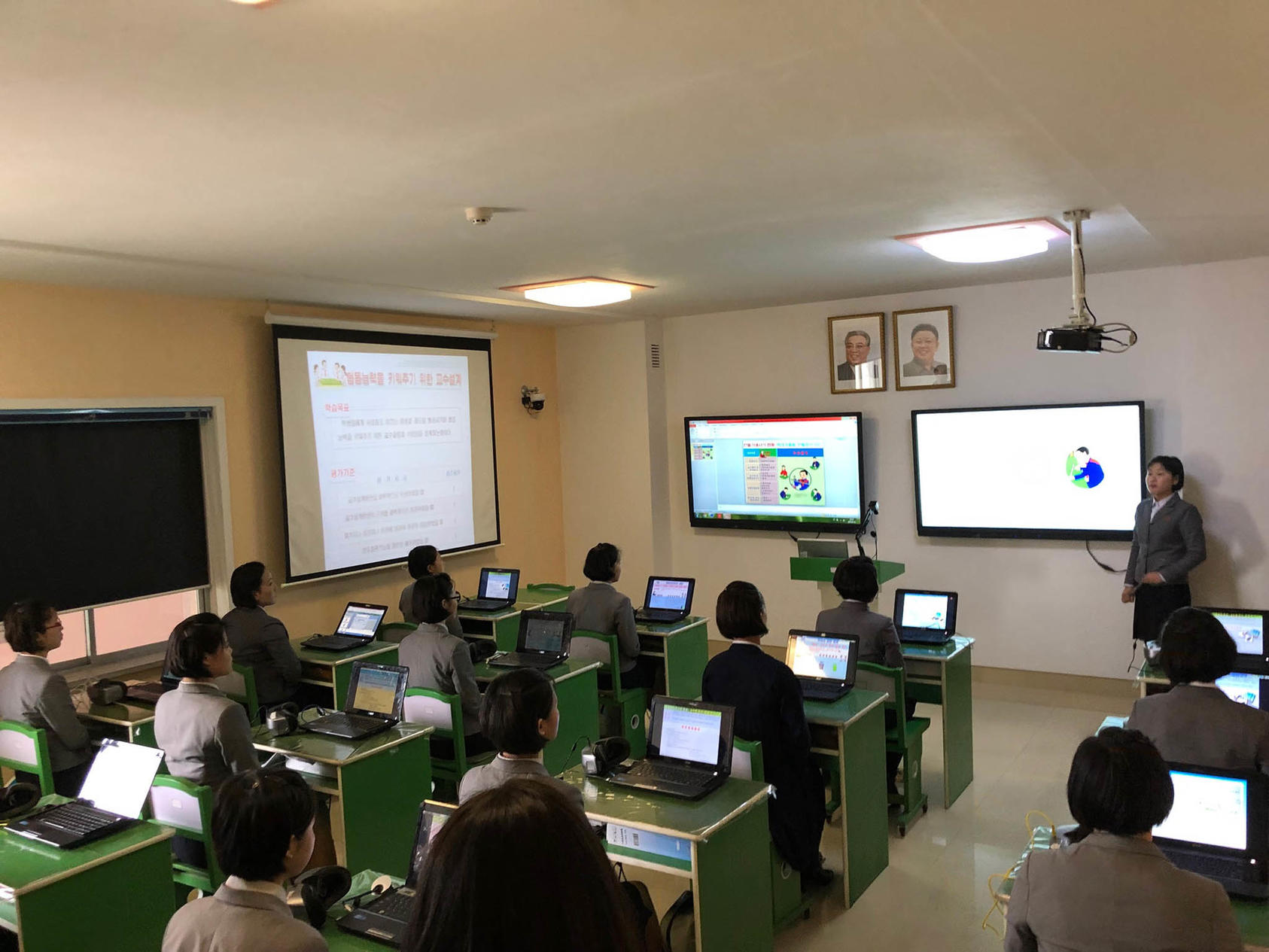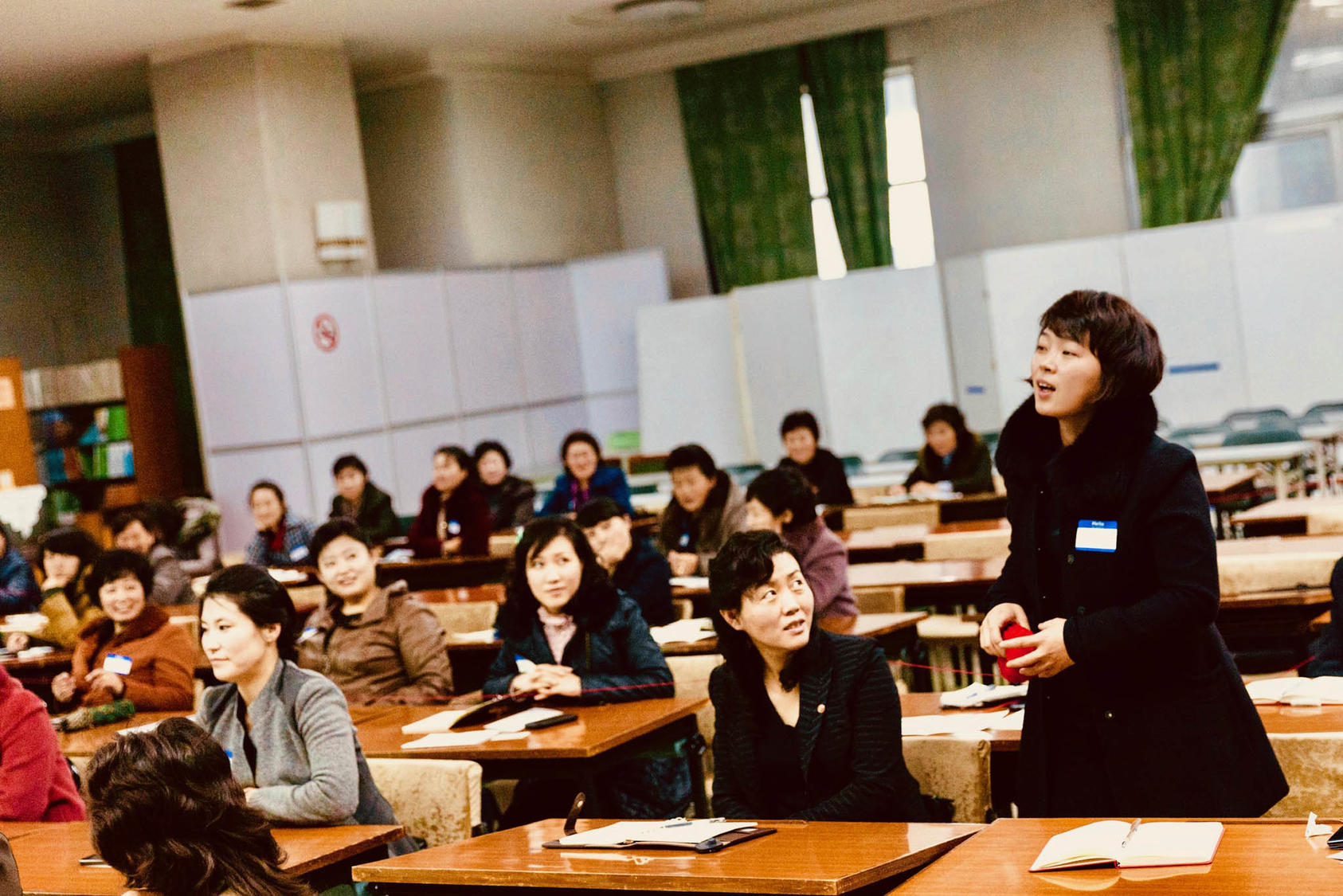Education in North Korea: Playing the Long Game
Empowering North Korean entrepreneurs can help lead to broader societal improvements that strengthen U.S.-DPRK relations and security.
For the last 30 years, U.S.-North Korea engagement has been erratic. Despite moderate success during the 1990s, the inconsistent nature of official engagement with North Korea over the last two decades has hindered sustained progress in improving bilateral relations and the welfare of North Korean civil society. More recently, the compounding effects of diplomatic and economic isolation caused by the U.S.-led global pressure campaign, an escalating array of multilateral and unilateral sanctions, the COVID pandemic and North Korea’s self-imposed border shutdowns have exacerbated the environment for economic and business engagement. At the people-to-people level, the barriers to engagement have even begun eroding relationships and local know how for many U.S.-based organizations.

Despite these challenges, Choson Exchange, a Singapore-based non-profit organization, has quietly and steadily moved forward with our mission. Our organization believes that encouraging the next generation of entrepreneurs in North Korea can be a viable path toward positive change and a healthy civil society. Our North Korean partners have welcomed our approach and consistency, and their appetite for educational programs in diverse sectors remains strong. From the outside, it may be easy to see the situation in North Korea as sometimes comical or even hopeless. However, our experience is that, at least with the North Koreans with whom we interact, the desire to build a better economic future for themselves and their families has never wavered.
In this analysis, we describe the background to our work, our experiences in the field and the observed effects of our programs. Then, we recommend ways that policymakers can help promote understanding and peaceful future interaction with North Korea while continuing to drive positive change in the country.
Teaching Entrepreneurship to Drive Positive Change
Since launching in 2010, Choson Exchange programs have reached over 2,000 North Koreans through lectures, workshops and seminars. We rely on volunteer international lecturers who teach a wide range of topics such as hospitality management, customer segmentation and pitching tips for small business seed funding. We combine inspirational stories from entrepreneurs with academic lectures that guide students on how to access local capital and grow a small business within the constraints of the North Korean environment. Our programs have also expanded to facilitating and promoting business networks between North Korean participants and institutions. Overall, our topics generally center on the core belief that entrepreneurship can drive positive sustained change in North Korea.
While Choson Exchange originally focused on in-country training, it evolved to allow North Koreans the opportunity to travel abroad, including for business workshops, conferences and even MBA courses at foreign institutions. A notable success was bringing North Korean partners to the St. Gallen Symposium in 2019, where they engaged in economic dialogue with fellow students. In 2015 and 2016, we helped place and support North Korean students studying for postgraduate degrees at the Nanyang University of Technology in Singapore. Our programs have also sought to research and promote the development of key opportunities for the North Korean economy, including our recent work on potential tourism growth in North Korea’s Kangwon province. While we originally intended this in-country work to evolve into opportunities for North Korean students to visit tourism zones abroad, the pandemic required us to pivot to online classes.
Since 2020, we have live-streamed courses into lecture halls in North Korea, but the number of internationally engaged organizations with this capacity has dwindled due to increasing logistical difficulties. The increasing number of referrals to new participants indicates that, although our focus remains on those interested in entrepreneurship and economic development, the program is well-received among various sectors of North Korean society interested in opportunity, from startups to established businesses to policymakers.

Choson Exchange’s inception and continuation in Singapore (and later Vietnam) has helped promote a perspective on North Korea that diverges from conventional think tank or policy views, and permitted us to engage without overtones of a Washington-centered agenda. This aspect is appreciated by our partners inside and outside of North Korea. Our relationships with our partners have persevered and remain largely unaffected by changing U.S. administrations and policies. As a result, organizations like ours are granted a unique window into potential engagement opportunities with North Korea.
Effects of Engagement
Economic development is clearly a priority of the North Korean government, and our experience working with individual North Korean entrepreneurs corroborates this. They are aware that economic development at the individual level increases quality of life and they are particularly interested in contributing to such.
We have seen an increase in the sophistication of interest in international economic ideas and in the willingness to consider and accept them. For example, concepts introduced in our earlier seminars, such as intellectual property (IP) law, show up as pertinent questions in later sessions. IP protections were a novel concept when discussed in the infancy of our courses, but we eventually found ourselves responding to questions on how competition and IP protections would work in North Korea. The desire to adapt foreign concepts to the local environment has never been higher. True to ideology, the North Korean leadership takes a long-term view of everything economic and is interested in ideas that help sectors grow organically and, perhaps more surprisingly, sustainably. Meanwhile, prospective North Korean entrepreneurs will enthusiastically seize any opportunity for a space in which they can operate.
In our ongoing online lectures, we focus extensively on using practical examples to convey the benefits of enterprise, particularly in areas like the service industry, hospitality, tourism and green sectors. Topics of contemporary relevance are more colorful and illustrative than sterile theory; real world examples include how informal bed and breakfasts can set up shop as small businesses and what local amenities tourists might want on a domestic seaside vacation in a varied and competitive market. We have also brought in waste management entrepreneurs to discuss green economic opportunities at both the individual and state level. While green growth may never be a pillar of North Korea’s philosophy of self-reliance, North Koreans have responded well to the role of individual entrepreneurs in developing products with sustainable processes. It is also important to understand that, while we are careful to provide examples that resonate culturally and are suitable to the maturity of the North Korean economy, North Koreans have no inhibitions about learning about novel international business concepts in the sharing economy, like AirBnB, and their underlying frameworks such as rental property law. Many of our participants have gone on to use the knowledge gained in our lectures to take advantage of structural economic changes in North Korea that have become more prevalent since we began teaching, including using private capital for construction.
There is also intangible value in interactions between North Koreans and international business leaders. Many of our seminar leaders are successful businesspersons, and the weaving of their personal anecdotes into their workshops is crucial in inspiring the participants’ first journey into enterprise. For example, a China-based coffee entrepreneur in our Women in Business program talked about how to set up a coffee shop from scratch to take advantage of a burgeoning lifestyle sector. Participants from that workshop went on to do just that in Pyongyang.
Policy Recommendations
The slow, but impactful, progress being made by organizations involved in education in North Korea is an important facet of Track II diplomacy that remains underutilized. U.S. administrations are often focused on short-term security achievements on the peninsula, but important as they are, this approach can sometimes miss the forest for the trees. The long-term impacts of empowering the next generation of entrepreneurs in North Korea can help lead to broader societal improvements that strengthen mutual relations and security.
North Korea appears to have prioritized security over economic development, but the latter still remains an important long-term concern that could drive bilateral engagement and benefit both sides. Pyongyang is increasingly looking toward economic blueprints from countries like Vietnam and Singapore. Given China’s growing economic power, if the United States seeks meaningful engagement with North Korea, it will need a broader and more forward-thinking approach that addresses its desires for economic advancement. Moreover, China’s rapid economic development and North Korea’s economic reliance on Beijing means that the United States and its allies have shrinking economic leverage beyond sanctions, which themselves are limited without Chinese support.
Education remains a promising vessel for a long-term transformation of relations. Although many might think educational exchange should occur only after normalization, the provision of educational opportunities to North Korea is not necessarily premature. When done appropriately (such as avoiding teaching technology for illicit purposes), education need not conflict with the existing sanctions regime against North Korea. Education lays out a clear path for dependent future relationships that provide significant economic levers for both sides. One need not look far to see successful examples of foreign education transforming a country’s economic relations with the outside while not undermining reticent political systems.
The policy implications related to education are a little more complicated than simply recognizing the potential in itself. Education must take the long-term view toward long-term goals, focusing on introducing sustainable economic ideas around entrepreneurship. There are many pathways for introducing these ideas, but they will require changes in the U.S. approach.
At a fundamental level, Washington should review the effectiveness of an isolating, punitive approach to North Korea and consider a more open and comprehensive approach to engaging North Korea that emphasizes long-term benefits rather than just short-term threats. A helpful first step would be to revisit and explicitly support the mutual desire for “new U.S.-DPRK” relations outlined in the 2018 Singapore Statement, which would underscore the importance of expanding the people-to-people exchanges that are critical for education to succeed at scale. Similarly, ending the ban on U.S. citizens visiting North Korea can help remove a significant psychological barrier to the willingness to engage with North Korea on all fronts. The travel ban as well as the related specter of violating North Korea sanctions have had a discouraging effect on educators, organizers and institutions who wish to contribute to positive change in North Korea. While Choson Exchange has not had difficulty in complying with U.S. laws, we recognize that U.S. Treasury Department restrictions may have impeded or discouraged education in North Korea by other outside parties.
Regarding education specifically, providing support for North Korean students in the form of scholarships and placements in educational institutions abroad is a short-term expense that could net a long-term relationship through educational diplomacy. For example, Washington could consider sponsoring scholarships for North Koreans to study at the Fulbright University in Vietnam (a leading liberal arts institution), which would formally recognize the role of education in improving relations, or use established government mechanisms like the State Department’s International Visitor Leadership program to permit educational visits by North Koreans to the United States.
A more open U.S. approach to the role of education in North Korea relations should focus on promoting a healthy civil society grounded in realistic applications suitable to the constraints in North Korea. Conveniently, this is also what North Korean students desire most, as this is the most beneficial to them in the long-term, too. Supporting and encouraging entrepreneurial activities in the form of small-medium enterprises as simple as bed and breakfasts or downtown cafes may seem trivial in the grand strategy of administrations focused on denuclearization and security threats, but this approach could be beneficial in the long game.
Ian Bennett is the associate head of programs on business and entrepreneurship at Choson Exchange. Jamin Jamieson is a program manager in online education at Choson Exchange.



